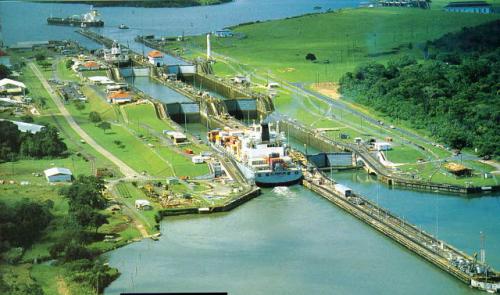Panama in the crossfire in the war between the United States and China
- Opinión

Panama and its dollarized economy have much to lose if they do not manage their relations with the United States, China and Venezuela in such a way as to reduce tensions. Both great powers can also lose out if they are not careful in their next moves.
The “trade war” between Beijing and Washington could have serious repercussions on the emerging Asian power. It could see its march towards the conquest of markets in Latin America blocked by a dispute centered in the isthmus. The geographical position of the country–that includes the Panama Canal–are important elements in the plans of the Chinese. Peking could decide to take a step backward in the hope of a better situation. They do not seem to be in a hurry.
In the case of the United States, the long-term strategy of its governments has been–since the time of President Carter–to put an end to the “causes of conflict” with the Panamanian people. A confrontation between China and the United States around their interests in the isthmus could interrupt the inter-oceanic maritime traffic of the Panama Canal. The United States would be greatly affected by the loss of both trade and military communication. The US “establishment” (that includes the governmental apparatus, transnational corporations and the techno-industrial-military complex) considers Panama more than just its “backyard”. It sees the isthmus as a bridge that dominates the region. The “establishment” was born with the conquest of the isthmus 175 years ago (the Mallarino-Bidlack Treaty). It is difficult for them–if not impossible, for the moment–to accept that this is coming to the end of an era.
The economic policy of the future government is tied to the Panama Canal and to its most important client: the United States. At the same time, the President-elect, Laurentino Cortizo, knows that the Popular Republic of China is the emerging world power. Panama finds itself in the midst of the crossfire in the “trade war” that the White House has declared on China. More than 20% of Chinese exports to the United States pass through the canal. Almost all of the exports of US grain to oriental markets (China) pass through the Panamanian isthmus. The income that this interchange represents benefits Panama with around six billion dollars that come into their economy annually.
In a few days, Cortizo will take possession of his office, he has already formed his cabinet and announced several measures that he will take after July 1, 2019. The cabinet is made up of a group of professionals from the private sector and from the Partido Revolucionario Democrático (PRD). It is a combination of young people and women who will work with veterans of past administrations. In questions of internal policy, Cortino does not promise new initiatives. He faces serious problems in the social sector–education and health care among others–and in the productive sector–agro, industry, construction–without proposals to confront the crises that are coming.
On various occasions, he has defined his position concerning future relations with China and Venezuela. The United States has already sent messages to the future President on what they expect from Panama and its relations with Beijing. Panama aims to put its geographical position and the Panama Canal at the service of a logistic centre that connects the Latin American region. The representative of the Council of National Security of the White House, Mauricio Claver-Carone, pointed out that any change in the status quo in the Panamanian isthmus would be considered by the United States as a “danger” for the interests of that country.
Secretary of State, Mike Pompeo, communicated by telephone to Cortizo that he expected Panama to continue collaborating with Washington’s policy towards Venezuela. The outgoing government of Panama has “lent” its aero-naval bases for the United States to develop their activities against Venezuela. Moreover, it has reduced its trade and has officially received a representative who is presented as sent from the National Assembly of the Bolivarian Republic.
Cortizo has been cautious in his declarations. On various occasions, he has said that he would like Panama to resume the role of a mediator between the parties in conflict. He mentions the role of General Torrijos that was central to the negotiations during the Central American insurrections in the decade of 1970. He does not indicate any enthusiasm for the erratic policy of Washington that manages the OAS and the Lima Group without a clear strategy. He should oppose the use of force in any conflict that would immobilize Panama in the midst of “the cross-fire”.
(Translated for ALAI by Jordan Bishop)
18 de junio de2019
- Marco A. Gandásegui, Jr., is a professor of Sociology with the Universidad de Panamá and an associate Researcher with the Centro de Estudios Latinoamericanos Justo Arosemena (CELA).
policy
http://marcogandasegui2017.blogspot.com/
Del mismo autor
- La pandemia no es el fin del capitalismo 23/04/2020
- Hay que masificar las pruebas contra un virus clasista 19/04/2020
- ¡Qué falta hacen los Comités de Salud de J. Renán Esquivel! 09/04/2020
- La desigualdad social y la desconfianza contribuyen a la epidemia 02/04/2020
- Hacen falta más ‘pruebas’ para ‘suprimir’ el coronavirus 26/03/2020
- La crisis del capitalismo y el coronavirus 19/03/2020
- Urge una movilización general para atacar el corona-virus 12/03/2020
- Se necesita liderazgo y transparencia para enfrentar el corona-virus 05/03/2020
- EEUU veta relaciones entre Panamá y China 27/02/2020
- Roberto Arosemena, sus ideas perduran y sus luchas continúan 20/02/2020
Clasificado en
Clasificado en:
China-EEUU
- Umberto Mazzei 10/06/2021
- Umberto Mazzei 09/06/2021
- Michael Klare 08/04/2021
- Matthew Ehret 24/03/2021
- Lejeune Mirhan 16/02/2021








